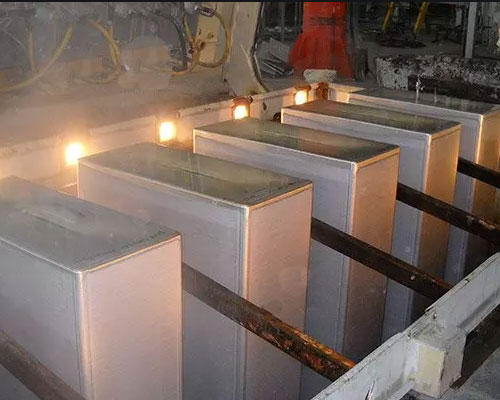Learn how an Aluminum Casting Company ensures precision in every project
Wiki Article
Finest Practices for Upkeep and Applications in the Light Weight Aluminum Foundry Field: A Thorough Review
Preserving devices in the light weight aluminum factory sector is necessary for functional success. Routine assessments and anticipating maintenance can greatly decrease downtime and enhance security. Advanced modern technologies, such as IoT and information analytics, play an essential role in this process. Nonetheless, recognizing the full extent of finest practices requires a better exam of specific methods and their influences on performance. What are the vital components that add to a reliable upkeep structure?Value of Routine Upkeep in Aluminum Foundries
Regular maintenance plays an essential duty in the effective operation of aluminum foundries. By systematically checking and servicing equipment, factories assure peak performance and longevity of machinery. Normal maintenance activities, such as cleansing, lubrication, and element replacement, aid stop unforeseen break downs that can result in pricey downtime.Routine checks boost workplace safety by recognizing potential risks before they intensify right into severe problems. Tools that is well-maintained operates a lot more efficiently, bring about boosted item high quality and reduced waste. In addition, adherence to a structured maintenance routine can support compliance with industry regulations, therefore cultivating an online reputation for integrity and quality within the market.
Applying Predictive Maintenance Techniques
Anticipating upkeep strategies take the principles of regular maintenance an action even more by leveraging information analytics and progressed surveillance modern technologies. In aluminum foundries, these methods enable drivers to expect devices failings before they take place, consequently reducing unplanned downtimes and enhancing operational performance. By making use of sensors and IoT gadgets, real-time data can be gathered on machine performance, enabling the recognition of prospective issues via predictive analytics.Optimizing Melting and Putting Procedures
Efficient melting and pouring procedures are important for optimizing performance and ensuring the top quality of light weight aluminum castings. To enhance these procedures, factories need to concentrate on precise temperature level control during melting, as this straight impacts the metallurgical homes of the alloy. Making use of sophisticated melting modern technologies, such as induction and resistance melting, can enhance energy efficiency and reduce cycle times.Moreover, executing automated pouring systems lessens human mistake and keeps consistency in the pouring process. Correct mold preparation, including sufficient preheating, is vital to avoid thermal shock and enhance mold and mildew durability.

Enhancing Security Procedures in Foundry Procedures
Focusing on security in light weight aluminum factory procedures is crucial for protecting employees and guaranteeing an efficient atmosphere. Reliable security methods include routine training sessions that stress the value of individual safety tools (PPE), such as safety glasses, headgears, and handwear covers. Furthermore, the establishment of clear emergency situation treatments is necessary in handling possible mishaps.Routine inspections of equipment and machinery aid determine dangers prior to they intensify into serious issues. Carrying out a robust coverage system motivates workers to interact security worries without anxiety of repercussion. Promoting a culture more information of safety assurances that every staff member recognizes their role in maintaining a safe and secure workplace.
In addition, guaranteeing proper air flow and monitoring air high quality can minimize direct exposure to dangerous fumes and dirt. By strengthening these methods, aluminum foundries can significantly lower the risk of crashes and produce an environment where workers really feel valued and safe, inevitably enhancing total functional effectiveness.
Leveraging Innovation for Improved Performance
Making use of advanced innovation has come to be significantly crucial for aluminum factories aiming to boost functional performance. Automation and robotics play an essential duty in enhancing manufacturing procedures, minimizing labor expenses, and reducing human mistake. Implementing real-time monitoring systems enables the continual evaluation of devices efficiency, enabling proactive upkeep and decreasing downtime.
In addition, the integration of information analytics gives valuable insights into functional workflows, assisting in better decision-making and source allocation. Anticipating analytics can identify potential failings prior to they take place, more maximizing upkeep schedules.
Furthermore, embracing advanced melting and casting technologies improves energy effectiveness and material return, which are essential for sustainability in the industry. By accepting these technological advancements, light weight aluminum shops can not just enhance performance but likewise preserve an affordable side in a significantly requiring market (aluminum metal casting). Inevitably, leveraging modern technology is critical in driving technology and enhancing general operational performance within the field

Regularly Asked Questions
What Are Common Indicators of Devices Wear in Light Weight Aluminum Foundries?
Typical signs of tools wear in aluminum factories include uncommon noises, decreased performance, increased resonance, overheating parts, leaks, and noticeable corrosion. These indications typically signify the demand for upkeep or potential substitute to prevent pricey downtime.How Can I Train Personnel for Effective Upkeep Practices?
To educate team for effective upkeep practices, one can carry out hands-on workshops, establish complete guidebooks, motivate mentorship programs, and carry out regular evaluations to review abilities and knowledge, guaranteeing all workers comprehend upkeep methods thoroughly.What Are the Ecological Laws for Aluminum Foundries?
Light weight aluminum shops go through different ecological guidelines, consisting of exhausts control, waste monitoring, and source preservation. Compliance guarantees marginal environmental impact, advertising sustainability while sticking to neighborhood, national, and global ecological requirements and laws.How Do Factories Take Care Of Waste and Recycling of Light weight aluminum?
Foundries take care of waste and recycling by applying systems for collecting scrap light weight aluminum, making use of sophisticated separation innovations, and teaming up with reusing facilities to ensure reliable recuperation procedures, consequently decreasing environmental effect and advertising sustainability within the industry.What Are the Prices Related To Implementing Advanced Technologies?
Applying advanced technologies in foundries incurs considerable prices, consisting of first investment, training, and maintenance expenses. Visit Website The long-term benefits, such as click resources raised effectiveness and lowered waste, frequently justify these expenditures, leading to improved success. (aluminum metal casting)
Report this wiki page